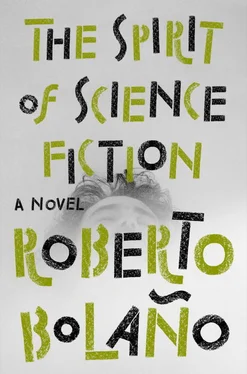We stopped at a red light.
“I don’t know where the hell El Mofles reads these things. He didn’t make it past the first year of high school.”
Green.
“Where did you read them?” The Aztec Princess didn’t move right away. It jolted forward.
“I go to the Librería Francesa! While the jackasses are lining up for Octavio Paz’s lectures, I spend hours digging around in there! I’m basically a nineteenth-century gentleman!”
“And you never run into Mofles?”
“Never!”
A Mustang going sixty miles an hour drowned out José Arco’s last words. Eventually I would learn that El Mofles only visited the Librería El Sótano, and then only occasionally. The story of Isou and Altagor and Georges Perec was very simple. Just after World War II, in a Paris still under rationing, Isou and Altagor met at one of the legendary cafés. Isou sat on the terrace to the far right and Altagor to the left, let’s say. Still, each was aware of the other’s presence. The tables in the middle were occupied by American tourists, famous painters, Sartre, Camus, Simone de Beauvoir, movie actors, and Johnny Hallyday.
“Johnny Hallyday, too?”
“That’s El Mofles for you, the bastard.”
And so our two phonetic poets sat in perfect anonymity. Only the two of them fully understood what was going on and knew themselves to be the Father of Metapoetry and the Father of Lettrism, greater enemies than the houses of Verona.
“According to El Mofles, they were both young and ambitious! Vanitas vanitatum! ”
“Fucking Mofles!”
So after gloomily downing their pastis and munching their sandwiches, the only sustenance either of them would get that night, they called for the check, but one of them asked for it in metalanguage and the other in lettrist caló, and the next minute they refused to pay. Their aim, apart from getting themselves noticed by the tables in the middle, was to get the waiters to speak to them in the languages in which they’d been addressed. Sure enough, insults were soon flying. The waiters swore at them under their breath, trying not to call attention to themselves. Isou treated the waiters like ignorant slaves and mocked Altagor. The Father of Lettrism, on the other side of the terrace, loudly bewailed the narrow-mindedness of the waiters and shook his fist at Isou.
“What assholes!”
“Ha-ha-ha.”
“Hee-hee-hee.”
“They’re Mofles’s heroes!”
The appearance of Gaston, the maître d’, a fierce warrior of the Maquis, put an end to the dispute. Gaston was a terror, and everybody knew it. Much to their chagrin, both poets paid up, and to make matters worse, they saw that they’d made fools of themselves in front of the select tables in the middle. Utterly crushed, Isou and Altagor left the café: it was then, out in the street, that they decided to meet in a duel to the death. (In their mutual despair, they believed that Paris wasn’t big enough for both of them.) The time was set for that very morning on the Champs de Mars, near the Eiffel Tower. And that is where Georges Perec comes in.
“Do you know Georges Perec?”
“Yes, but I haven’t read anything by him.”
“He was one of the best,” said José Arco very seriously; our motorcycles were going ten miles an hour along the very edge of the road.
“We look like two night-shift workers on our way home,” I said.
“Basically,” said José Arco.
According to El Mofles, Perec was a kid who rose with the sun. First thing in the morning, he snuck on tiptoe out of his grandparents’ house, got on his bike, and hightailed it around the city, no matter the weather. The morning in question, he went pedaling around the Champs de Mars. And wouldn’t you know it, the first person he runs into is Altagor, sitting on a bench and reciting one of his own poems for courage. Little Perec stops near him and listens. It goes like this: Sunx itogmire ésinorsinx ibagtour onéor galire a ékateralosné. Which to the boy’s ears sounds the same as if ten years ago you and I and El Mofles had met Mary Poppins in person singing “Supercalifragilisticexpialidocious.” According to El Mofles, little Perec—who despite his youth is painfully polite and pedantic—begins to applaud with barely contained enthusiasm, which attracts the attention of Altagor, who looks at him and asks Veriaka e tomé?
“Oh, my God, Mofles is too much.”
Tumissé Arimx, answers the boy, and Altagor’s resolve crumbles. He sees the boy as a portent, a sign telling him to keep working come hell or high water. So he gets up, dusts himself off, bows down to the boy as if before fate itself, and goes off to his room to sleep. Shortly after this, the boy runs into Isidore Isou, and the same kind of thing happens. Maybe Isou doesn’t say a word to the boy. Maybe he just sees him riding his bike around the Champs de Mars and singing Echoum mortine flas echoum mortine zam, and that’s all it takes. Years later, when Georges Perec wrote the account I Remember, for reasons unknown he forgot to include this story.
“Perec hasn’t been translated into Spanish, and El Mofles doesn’t speak French. I leave you with that mystery for breakfast.”
All of Mexico City was bathed in a deep yellow light. We had arrived. I felt less like eating breakfast than like sleeping; with Laura, if possible. I pointed out to José Arco that I had seen worse in the last few days.
“El Mofles’s universe is full of stories like that. I wonder if he might be responsible for one of those little magazines.”
“We’ll ask him,” I said.
Then I left the motorcycle on the first-floor landing, maybe with the secret hope that it would be stolen, and I went up the stairs two at a time.
When I woke up, the first thing I saw was Jan’s flushed face and Angélica Torrente’s Greek profile smoking a Delicado and then Laura’s serene, expectant smile, all connected by a kind of arc of energy, very fine and very black, an effect that I attributed to the sleep in my eyes, and finally, as I pulled the sheet up to my nose, I saw the open door and the plants in the corridor shuddering and the daughter of one of the tenants walking away with a roll of toilet paper in one hand and a transistor radio blaring in the other. Angélica Torrente had been here for an hour. The entire time, she’d been arguing with Jan. Of course, that wasn’t why she’d come: the purpose of her visit was love and confessions. But things got off track, and the two of them found themselves arguing, sorrowfully and stubbornly, and though most of the time it was at the top of their lungs, they didn’t manage to wake me. The problem was the table made of science fiction books. Jan had shown it to her with the beaming pride of a Chippendale collector, and Angélica, after studying it in astonishment and disgust, had decreed that it was nothing less than a slap in the face to literature in general and science fiction in particular. “Books should be on bookshelves, neatly organized, ready to be read or consulted. You can’t treat them this way, like Meccano pieces or vulgar bricks!” Jan argued that many city dwellers under siege had relieved their hunger by masticating the pages of books: in Sevastopol in 1942, a young writer had ingested a good chunk of Proust’s In Search of Lost Time, in the original French. Science fiction, Jan believed, was especially well suited to serendipitous bookcases, like the bookcase-table, for example, without being any less valued for the content of its pages or its tales of adventure. According to Angélica, this was idiotic and impractical in the extreme. Tables were for eating on, for spilling sauces on, for stabbing with knives in fits of rage. My God! was Jan’s response, accompanied by a dismissive wave. That has nothing to do with anything! You don’t get it! There are tablecloths!
Читать дальше












